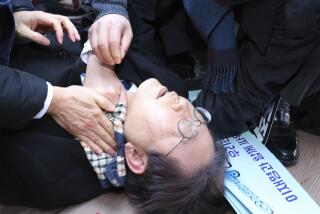Ruling Officials, Opposition Leaders Exchange Views
- Share via
Kim Sang Hyun and Lee Jong Chan had breakfast together with a mutual friend Saturday at the Ritz-Carlton Hotel in Laguna Niguel.
Kim, one of the leaders of South Korea’s democratic opposition, served two two-year prison terms for his activities and is still banned from all political participation. Lee, a retired brigadier general and former high-ranking officer of the Korean Central Intelligence Agency, is a parliamentary leader of the ruling Democratic Justice Party.
Parley Called Significant
Their mutual friend was U.S. Sen. Gary Hart, whose Center for a New Democracy sponsored the weekend conference, “Transitions in the Pacific Rim: Leadership for the Next Twenty Years.”
According to one Korean-American observer, the fact that the meeting took place was more significant than the topic discussed--plans for a similar conference in Seoul, the South Korean capital, next year. Also attending the breakfast were Park Tong Jin, South Korea’s minister of national unification; Chung Jeymoon, an opposition member of the national assembly, and Kim Kyung Won, the South Korean ambassador to the United States.
“The purpose of these conferences is not only to discuss trade,” Hart said, “but to expose emerging leaders to one another and bring together diverse political perspectives from different areas.”
It is conceivable, Kim said in an interview, that at some future conference the designation of the South Korean opposition and government participants might be reversed. But Kim and his opposition colleague, Chung, admitted that such a change was not likely anytime soon.
Ruling Parties Entrenched
Nor is it likely that any of the dozen or so opposition representatives from other East Asian nations would be returning as government officials, unlike the United States, Canada, Australia and New Zealand, where two parties regularly reverse roles after elections. Conference participants agreed that most East Asian countries, perhaps with the exception of the Philippines, are likely to remain dominated by a single ruling party for the foreseeable future.
Had it not been for Hart’s intervention with the South Korean government, Kim would not have attended the conference, aides to both men said. Kim was only given his passport the day he was scheduled to leave the country, and his wife was not permitted to leave with him.
Kim served for nine years as an opposition member of the national assembly, rising to the position of floor leader, until he was arrested and imprisoned for opposing President Park Chung-hee. He is still not permitted to vote, run for office, or speak or write on any political subject.
Had Consular Status
Kim’s status has had no effect on the way he was treated once he left South Korea, according to Young Shim Dho Lee, chief of staff of the national assembly’s foreign affairs committee. Aboard the government airline, “he flies first class with us,” she said. Kim was also afforded consular courtesies while in the United States.
More to Read
Sign up for Essential California
The most important California stories and recommendations in your inbox every morning.
You may occasionally receive promotional content from the Los Angeles Times.













